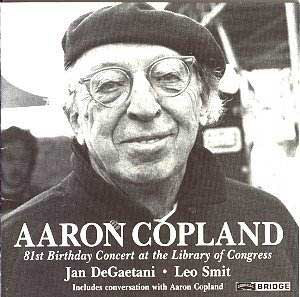The Library of Congress organised a concert to celebrate
Coplandís 81st birthday in November 1981. Jan DeGaetani (1933-1990)
was a staunch supporter and proponent of the contemporary repertoire
and especially that of her native country Ė many American composers
had cause to be grateful to her for her idiomatic and expressive performances.
Leo Smit had worked closely with her, as well as pursuing his own polymathic
interests. He was also a notable exponent of Coplandís piano music.
The recital ranged widely; piano works early (Three Moods, 1920-21)
and late (Night Thoughts, 1972) and the mid period Dickinson settings,
the centrepiece of the recital. To garnish the occasion still further
there are some of the Old American Songs, principally the Second Set
of 1952, with such old favourites emerging newly minted as Simple
Gifts and At the River.
DeGaetaniís rich mezzo, well equalized throughout the
scale, brings "true simplicity" to the Old American Songs,
subtle in At the River (its "wrong note" pianism
banishing complacency) and moving in Simple Gifts, with Smit
providing the most adroitly effective of support in the rhythmically
displaced piano accompaniment. He is equally convincing in the early
Three Moods, originally given a French title, and according to
the notes only receiving a first performance in 1981 a few months before
this concert, with a dedication to Smit Ė though Iíve read elsewhere
that Copland himself premiered them in concert at the time of their
composition. The first is dissonant and fractious, the second a little
glinting Debussyian affair, and the third a syncopated number with a
show tune embedded in it. By way of immediate contrast Night Thoughts
was composed for the 1972 Van Cliburn Piano Competition. With its
widely spaced chords and slow, meditative sense of overlapping it makes
an intriguing foil for the more youthfully combustible composer. The
Twelve Poems of Emily Dickinson, Coplandís first major
vocal work, date from 1949-50. They cover a wide variety of moods and
feelings, impressions and sensibilities and Coplandís settings are ones
of amplification and extension of the text whilst remaining true to
the very personal idiom of the poems. Thus in the first setting, Nature
the gentlest mother he hints in the piano part at the pastoral,
whereas the succeeding There came a wind like bugle the bell
tolling and violence of the setting mirror the textís violent unease
Ė with DeGaetaniís downward extension on the final words exposing their
dramatic finality. In The World feels dusty Copland provides
a simple rocking accompaniment, a cradle song of anticipated death -
elsewhere in the cycle evoking the loss and bewilderment explicit in
the settings with a kind of trenchant simplicity. Sleep is supposed
to be erupts with real violence, emphasised by the coldness of the
acoustic, and in I felt a funeral in my brain whilst DeGaetani
starts rather backward in the balance, the funereal tread in the piano
leads on to wandering tonalities in the vocal line, well conveyed here,
and an increasing sense of fracture and collapse. Coplandís piano accompaniments
hint, suggest, elide, now spare, now furious, all the while managing
to convey the myriad suggestible implications to be gleaned from the
texts.
There is a charming talk, self-deprecatory and amusing,
between Copland, Smit and Donald Leavitt of The Library of Congress
and a delightful encore, The Little Horses. It was a memorable
concert in the Coolidge Auditorium that November in 1981.
Jonathan Woolf


